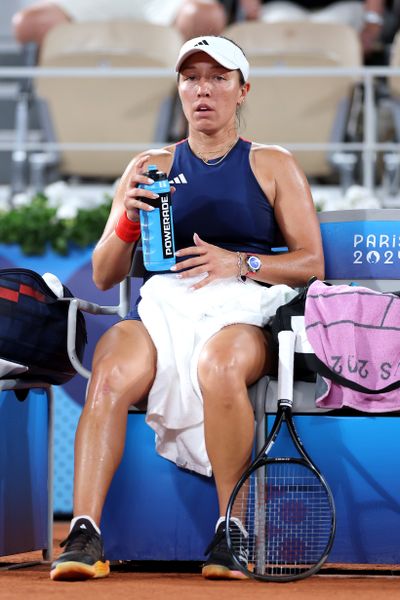Paris, Olympic athletes brace for extreme heat Tuesday

Paris and much of France are experiencing a quick strike of high heat and humidity that began Monday in some places, posing challenges for athletes and spectators.
The heat could last until Wednesday or Thursday, with temperatures rising well into the 90s in some places. Factoring in the humidity, heat indexes could reach near 105 degrees Fahrenheit in parts of southern France.
Meteo-France, the national weather service, issued a yellow alert for Paris and most of central France, which indicates a one- to two-day period of heat that could be dangerous for vulnerable populations and those working outside or engaged in physical activity. Parts of southern France are under an orange alert, issued for intense and dangerous heat expected to last three days.
The heat was already being felt Monday by tennis players on the clay courts of Roland Garros, while other sports braced for impacts Tuesday.
“The athletes who undertook heat adaptations will be well prepared, but it’s still a challenge. Also, it looks to be a bit humid, which is much more difficult to compete in,” said Geoff Burns, an exercise physiologist with the U.S. Olympic and Paralympic Committee. “Triathlon is one sport, especially the men’s on Tuesday, that might see some of the effects on the run leg. You might not see ice vests in the morning, but on outdoor athletes in the afternoon, I would definitely expect to see them, as well as ice on the neck and maybe head.”
Paris is forecast to reach the mid-90s on Tuesday, with heat indexes reaching the upper 90s to low 100s (mid- to upper 30s Celsius). The most intense heat is expected in central and southern France, where heat indexes could climb to 100 to 105 in some cities hosting Olympic soccer matches Tuesday. To combat the heat, officials are distributing water bottles from a supply of more than 2.5 million that were ordered in anticipation of potentially dangerous heat during the Games.
Nighttime temperatures will remain elevated, hovering near or above 70 degrees in many locations, making it hard to cool off. A lack of air conditioning in the Athletes’ Village led the United States and several other countries to bring portable air-conditioning units to ensure a comfortable sleeping environment for their athletes.
Meteo-France published a summary of temperatures expected in some Olympic cities, with highs reaching the mid- to upper 90s in many cities hosting events, including Paris. In Nice, nighttime lows are forecast to stay above 77 degrees.
Soccer matches are scheduled to take place in some of the cities in central and southern France expecting the most intense heat:
- In Paris, high temperatures are forecast to reach the mid-90s, with heat indexes in the upper 90s to low 100s, by the start of Tuesday’s 3 p.m. match between Dominican Republic and Uzbekistan, cooling to near 90 degrees by the end of the match. Cooler 80s are expected by the start of the 9 p.m. match between Paraguay and Mali.
- In Saint-Etienne, high temperatures are forecast to reach 95 to 100 degrees on Tuesday afternoon, with heat indexes in the upper 90s to low 100s. Temperatures should cool into the 80s during the 7 p.m. match between the United States and Guinea.
- In Marseille, where New Zealand is scheduled to play France on Tuesday, high temperatures are forecast to reach the low to mid-90s Tuesday, cooling into the 80s for the 7 p.m. match.
- In Lyon, high temperatures are forecast to reach 95 to 100 degrees on Tuesday afternoon, with heat indexes in the low 100s, cooling through the low 90s and upper 80s during the 5 p.m. match between Ukraine and Argentina.
- In Bordeaux, high temperatures are forecast to reach the upper 90s to low 100s on Tuesday afternoon during the 3 p.m. match between Spain and Egypt, with heat indexes near 105 degrees, cooling to the mid-90s by the end of the match.
By Wednesday, highs in Paris should cool to the low 90s, then into the 80s Thursday through the weekend. But after periods of rain dampened the Opening Ceremonies on Friday, occasional downpours are forecast around Paris from Tuesday through Thursday.
The potential for a heat wave during the Paris Olympics, being held during what are typically the city’s hottest weeks of the year, has drawn much attention from both scientists and athletes. The average temperature in Paris during late July and early August has warmed by more than five degrees since 1924, the last time Paris hosted the Olympics, according to a report published last month. In that time, the nonprofit Climate Central says that “scorching days” with highs of 86 or higher have become nearly three times more frequent in Paris.
France has experienced many deadly heat waves in recent years, including heat waves that led to more than 5,000 deaths in 2023 and more than 2,800 deaths in 2022. France’s most deadly heat wave killed nearly 15,000 people in August 2003. Researchers have found that human-caused climate change is making heat waves in Europe and other parts of the world hotter than they otherwise would have been.